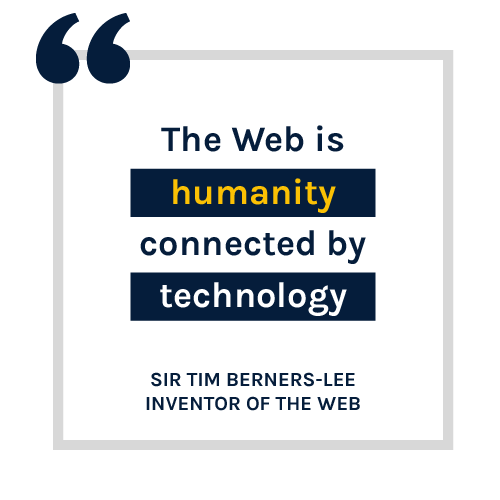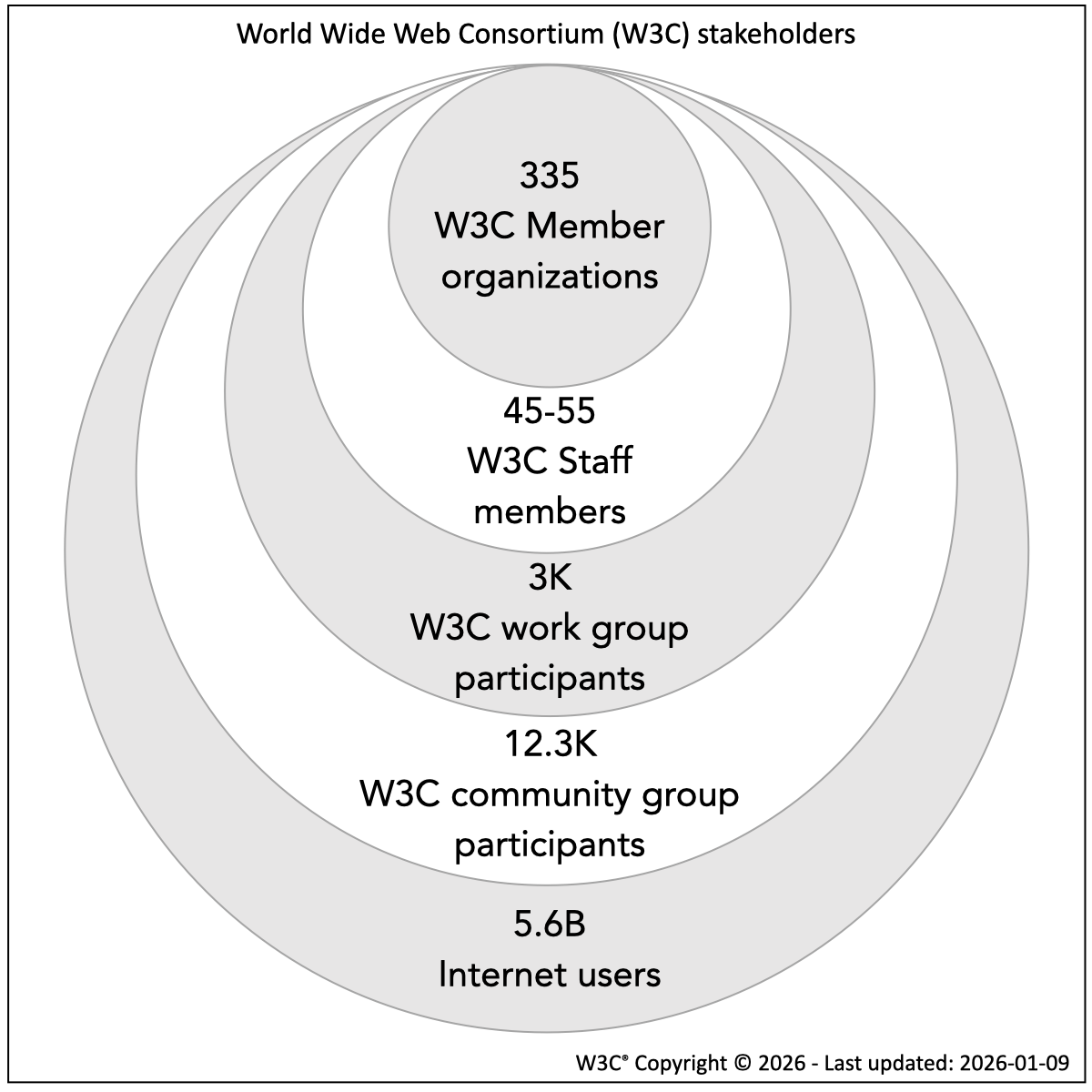The MacArthur Foundation & the W3C
June 2019
Introduction

Billions of people use the Web every day, for it is one of the most significant and powerful inventions of our time. The Web fosters communication, collaboration, education, innovation and democracy on a global scale. As the Web’s scope grows, those unable to access the benefits of technology are increasingly marginalized.
In 2016, the United Nations declared: “the spread of information and communications technology and global interconnectedness has great potential to accelerate human progress, to bridge the digital divide and to develop knowledge societies.” The report stressed “the importance of applying a comprehensive human rights-based approach when providing and expanding access to the Internet and for the Internet to be open, accessible and nurtured by multi-stakeholder participation.” The Web that is truly for all must therefore be managed as a commons, a global resource available to all members of society to use for individual and collective benefit, and guarded from the dominance of particularized interests.
At the same time, society is now reckoning with fears about the weaponization of Web technology. Hacking, snooping, and theft of personal information have eroded trust in the Web. Misinformation, impersonation, and radicalization threaten our democratic self-governance.
The MacArthur Foundation has a long history of supporting ethical innovations and, more recently, promoting civil liberties in the digital age. Participation in online communications is a component of modern exercise of civil liberties. A fundamental element of securing our digital civil liberties is to design protection for them into the Web from the outset.
For this reason, we believe the MacArthur Foundation can help the World Wide Web Consortium (W3C) strengthen the Web both to foster greater digital inclusion, and to combat the abuses that put civil liberties at risk.
What is the World Wide Web Consortium
Sir Tim Berners-Lee, 1998 MacArthur grant winner, founded the Web Consortium in 1994 to ensure the long-term growth of the Web. We do so primarily by developing freely available and open standards that ensure that the Web remains open, accessible, and interoperable for everyone around the globe. These building blocks undergird the innovations that have transformed the way we work, learn, socialize, manage our health, and entertain ourselves.
Our standard formats, protocols, and application programming interfaces enable programs –and programmers– to work together without explicit coordination. Because the standards-development forum has already supported their advance coordination of needs and interests. We have worked to create a Web that is accessible to all, from any device and in any language; a Web that empowers all of us to achieve our dignity, rights, and potential as humans.
Some of the Web Consortium's most important contributions to the Web include:
- Hundreds of open technologies that support search engines, social media, trillions of dollars of online commerce, and more than a billion Web sites;
- Technologies and guidelines that enable people with disabilities to access the Web;
- Built-in support for communication in many of the world's languages;
- A Patent Policy that helps guarantee that W3C standards may be used by developers without payment of royalty.

Our open standards have an impact on billions of users, whether they realize it or not. Like Berners-Lee himself, W3C is not a household name to the general public. Yet we have earned important recognition for our global impact: the Boston Globe ranked W3C the most important achievement associated with MIT in its first 150 years. We’ve won two Emmy Awards: in 2016 for our work to make online videos more accessible with captions and subtitles, and again in 2019 for standardization of a Full TV Experience on the Web. Our impact even extends beyond this planet: NASA has used our technologies in both the Spirit and Opportunity Mars rovers.
The Web Consortium is a not-for-profit organization. Our revenues come primarily from Membership dues. Today, more than 450 Members from around the world lead development and implementation of Web technologies. Member revenues and some grants support a staff of 50 to 60 led by Tim Berners-Lee and CEO Jeff Jaffe.
Technologies that meet the varied needs of society do not happen by chance. They are designed and standardized, not by one company, country, or community, but through the work of the Web Consortium. Our community extends far beyond our Membership. More than 10,000 developers worldwide participate in discussions to incubate new work. Standardization work at the Web Consortium is conducted in 30 working groups and a dozen interest groups. Our success depends on a number of factors:
- Our community must be diverse enough to represent a broad range of societal needs. Open, multi-stakeholder standards-making is a key part of digital technology infrastructure governance. As society's needs evolve and more and more people gain Internet access, it is critical that the Web Consortium be capable to support a broader set of participants.
- Our stakeholders must trust that our staff and process support neutrality, fairness, quality, and efficiency. We have earned community trust in our 25 years. However, we must continue to update our skills as facilitators and conveners, as well as our knowledge of industry requirements, user needs, and the evolution of technology.
- Adoption of W3C standards is voluntary, and so the world will only use them if they meet real-world needs, are of the highest quality, and are developed in a timely fashion.
At the start of the Web thirty years ago no one imagined how indispensable it would become; we now have knowledge sharing, commerce, and entertainment beyond what could then be imagined. The Web is a vital global commons. Its health relies in part on tending by organizations such as the Web Consortium that have built a global community, earned that community's trust, and scaled along with the Web. However, increased demand for Web capabilities and growing threats to the integrity of the Web have outpaced our organizational capacity.
Why fund us now?
25 years after our founding, we have determined we must evolve our organizational structure to increase our agility and meet diverse global needs. We will be leaving the tutelage of our host institutions to incorporate as a U.S. non-profit. Our global nature will remain the same, as will our Membership model and process.
The prospect of being able to operate as a single global organization is exciting, but it carries financial risk. To expand and thrive, we need the support of benefactors who share our passion for fairness and civil liberties.
This is why we have created an Establishment Fund, to give us the financial support and security to enable this important transition. Our vision is to secure a group of core mission-aligned sponsors to power web standardization into the next era. It will ultimately be these Establishment Fund sponsors whom billions of global web users will thank for ensuring the Web Consortium continues to lead the fight for the open and accessible web for all.
We would be honored to include the MacArthur Foundation as one of the core Establishment Fund sponsors, given our deeply shared interest in creating a just and vibrant social landscape.
Below we describe some of the areas where we believe that the MacArthur Foundation and W3C share common interests: global digital inclusion and protecting human rights and civil liberties online.
A Web for all: Building the technologies for worldwide digital equity
"The power of the Web is in its universality.
Access by everyone regardless of disability is an essential aspect."
Sir Tim Berners-Lee, inventor of the Web and Director of the World Wide Web Consortium
Part of the Web Consortium's mission is to create a Web for All, regardless of ability, mobility, language, script or culture. We have done pioneering work in the fields of Web accessibility and internationalization as well as enhancing Web security and privacy, But we know we must do more.
2019 marked a milestone - in 2009 only 20% of the world was online; now 50% of the world are connected. As the next 50% of the world join the Web, we must ensure that the Web they join is safe, inclusive, international and accessible.
Web Accessibility
In 2006, the United Nations adopted the Convention on the Rights of Persons with Disabilities (CRPD) which reaffirmed that all persons with all types of disabilities should be able to enjoy all human rights and fundamental freedoms. The Convention defined access to information, including web and digital content, as a human right. Digital accessibility, including web accessibility, is key for equal access, opportunity and participation for all.
When websites and Web tools are properly designed and coded, people with disabilities can use them, and individuals, businesses, and society all benefit. The Web Consortium’s Web Accessibility Initiative (WAI), launched in 1997, develops technical specifications, guidelines, and techniques, as well as supporting resources such as outreach and training materials to promote awareness and implementation. WAI’s Web Content Accessibility Guidelines (WCAG) is regarded as the authoritative international standard for Web accessibility, and has been adopted or referenced by many governments around the world. However, as the complexity of the Web increases, and as technologies as diverse as digital publishing and virtual reality converge onto the Web, the need for up-to-date accessibility support in advanced technologies is increasing exponentially. Without the Web Consortium's efforts, people with disabilities would be left further behind.
Internationalization
Only a fraction of the world's population of almost 8 billion speaks English, and yet over 50% of online content is written in that one language. Those whose voice and language are not included on the Web will be increasingly marginalized and excluded. They will not receive the economic, educational or democratic benefits of the Web and by not having their presence, we lose the potential of the Web to reflect the richness of the world.
The Web Consortium launched the Internationalization of the World Wide Web Activity in 1998 to make the Web truly 'world wide'. For the Web to truly work for stakeholders all around the world engaging with content in various languages, there must be a collaboration of language experts, Web site designers, developers, and vendors who are active in moving the Web forward. We will only connect all communities that share a language when the Web supports all the world's languages.
Privacy and security
Privacy and security –an integral part of human rights and civil liberties– have long held an important place in the Web Consortium's agenda. For example, our work has been instrumental in improving Web security through the development of authentication technologies that can replace weak passwords and reduce phishing and other sophisticated cyber attacks. However, users rightfully fear the misuse of their personal data and being tracked online, the spread of disinformation, and other online harms. These are difficult and urgent challenges. The Web Consortium community is well-positioned to take them on but needs additional support.
Conclusion

The Web Consortium has, since its inception, fostered civil liberties by building a Web that allows all to participate, create and innovate online. However, there is so much more that can and must be done.
As we embark in restructuring the Web Consortium after over twenty-five years of existence, the Web has come a long way but myriad opportunities lay ahead. Given our history and track record, your financial contribution toward our Establishment Fund will allow us to fund new innovations in key projects that help privacy, security, Internationalization, and Web accessibility, aiming to ensure that Web technologies work together for the good of the Web and a Web which is good for all.